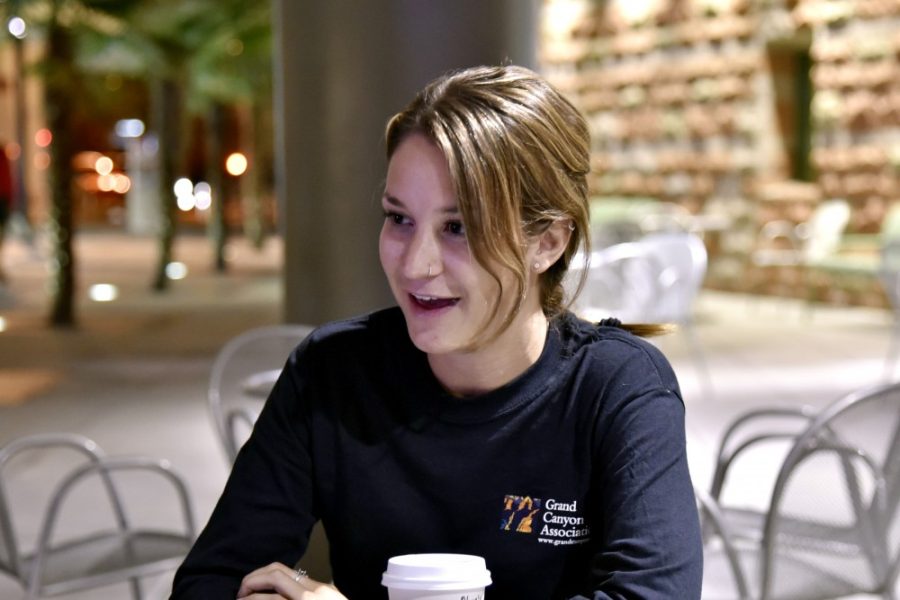Among the sea of Donald Trump and Hillary Clinton memes, the voices backing both candidates intensified as Election Day drew closer. Phoebe Johnson, a junior from England studying American literature, took particular interest in the unique dynamic of the 2016 presidential election.
Originally from Devon County in England, Johnson studies in an American literature program at the University of East Anglia, where she spent her first two years in Norwich, England. Her program requires that she spend her last two years abroad with at least one in the U.S. Johnson split her study abroad program into two countries and plans to spend a year in New Zealand after finishing her year in the U.S.
“[The study abroad requirement is] really to help you understand and immerse yourself in what you’ve been studying the past two years,” Johnson said. “I wanted to experience a landscape that was completely different than my own, to really absorb the culture and different people’s mentalities.”
RELATED: Where to watch election results on and off campus on Nov. 8
Johnson also showed considerable interest in the American political realm as well. She first encountered the tone and nature of the election when watching a political advertisement on television while at the airport.
“I hear loads of music and it’s an advertisement for the election saying, ‘Who will win?’ It was almost like a boxing round,” Johnson said. “This is a joke, I thought. This is ridiculous. It’s something serious and it’s being made into some sort of comedy sketch.”
Yet among the pomp, she watched as American politics mirrored those within her own culture, particularly in light of the British referendum over whether to leave the European Union over the summer. For 23 years, the EU united 28 European countries under a common currency and fostered political partnership. This relationship soon came into dispute.
“It’s like what Hillary [Clinton] said: ‘Build bridges, not wars,’ ” Johnson said. “That’s what people were saying about leaving the EU—that we should be building bridges between our countries and becoming culturally diverse. I think people are really scared of using their identity, that cultural identity.”
Johnson said she believed that walking out on the EU would contradict the hard work put into keeping it alive.
“A lot of people were devastated because they’ve spent years working hard to correspond with other countries in Europe through trade, law, etc., yet people saw that it wasn’t working and just wanted to leave,” Johnson said. “I think it’s brought out a lot of selfish mentalities and xenophobia all of the sudden; it’s almost become acceptable and more openly spoken about.”
RELATED: Welcome to the Dirty T: RA Alejandra Hinojosa finds passion in oncology and travel
Johnson noted that this political stance of building barriers not only prevailed within England, but among U.S. citizens as well.
“There are similarities in mindset, because there are definitely two sides: There is the more modernist/progressive outlook, and there are the older ideals where you want to keep to yourselves and build borders,” Johnson said. “It’s so complicated, and obviously, one candidate will not fit snugly into one side. I think everyone is kind of squished in the middle.”
Johnson told a story of her friend who had a hard time voting for anything but a Republican because of her family’s conservative views, even though this would be an act in contrast to her true beliefs.
“In American culture, I feel like there is a lot of hypocrisy and like some people just do what they’re told and jump on a bandwagon,” Johnson said. “I feel like a lot of people in America are very glued to family traditions and sometimes are a bit blinded so they can’t see change, because you have to listen to see change.”
She further said that the American attitude surrounding politics conveyed a sense of stubbornness embedded within American society.
“I was talking to my friend the other day about why you call part of eastern America the midwest, because that’s the bit that was discovered first,” Johnson said. “I asked why you wouldn’t change that, and they said it would be too hard for everyone to change it now. And to me, that just sums everything up. Everyone is too stuck in their ways and no one wants to change; I thought it was sad in a way.”
Johnson held hope for the future, though, and said she believed that following the referendum, young voters will become more active citizens as they see how much political change affects them.
“Statistics show that a lot of people that wanted to stay in the EU didn’t vote, and I think that’s because a lot of young people weren’t really aware of what was about to happen,” Johnson said. “Now that it’s happened, they’ve gotten kind of a shake and people are much more likely to educate themselves.”
Follow Lindsey Otto on Twitter.









